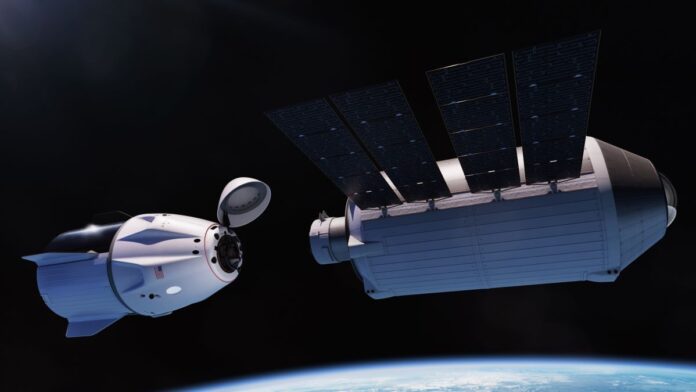The first-ever private space station could launch to Earth orbit a little over two years from now.
California-based startup Vast Space plans to loft its Haven-1 outpost aboard a SpaceX Falcon 9 rocket no earlier than August 2025, the companies announced today (May 10).
That initial mission will be followed in quick succession by Vast-1, a four-person jaunt to the new station that could last up to 30 days. Vast-1 will also launch atop a Falcon 9, and its astronauts will ride on a SpaceX Dragon capsule.
“Vast is thrilled to embark on this journey of launching the world’s first commercial space station, Haven-1, and its first crew, Vast-1,” Vast CEO Jed McCaleb said in a press release today (opens in new tab). “We are grateful to SpaceX for this exciting partnership that represents the first steps in Vast’s long-term vision of launching much larger, artificial gravity space stations in Earth orbit and beyond.”
Related: NASA looks to private outposts to build on ISS legacy
Vast is young, founded just two years ago. And it’s very hungry, as McCaleb’s words suggest.
Eventually, the company aims to operate a “100-meter-long [330 feet] multi-module spinning artificial gravity space station launched by SpaceX’s Starship transportation system,” Vast representatives wrote in today’s release. (Starship, the most powerful rocket ever built, is still in development; it flew in fully stacked mode for the first time just last month.)
“In support of this, Vast will explore conducting the world’s first spinning artificial gravity experiment on a commercial space station with Haven-1,” Vast added.
The company is selling up to four seats on Vast-1. (The ticket price has not been publicly released.) SpaceX will provide astronaut training, spacesuits and other such services for the mission, as it did for Ax-1, a private flight to the International Space Station (ISS) operated by Houston-based company Axiom Space in April 2022.

Haven-1 — which will eventually be incorporated as a module into a larger space station, if all goes according to plan — is one of several private outposts currently in the works.
For example, Axiom Space plans to launch several modules to the ISS in the next few years. This complex will then detach and become a free-flying outpost.
And in late 2021, NASA awarded a total of $415 million to three private teams led by Blue Origin, Nanoracks and Northrop Grumman. The space agency wants at least one commercial station to be up and running in low Earth orbit before the ISS retires at the end of 2030.
Mike Wall is the author of “Out There (opens in new tab)” (Grand Central Publishing, 2018; illustrated by Karl Tate), a book about the search for alien life. Follow him on Twitter @michaeldwall (opens in new tab). Follow us on Twitter @Spacedotcom (opens in new tab) or on Facebook (opens in new tab).

